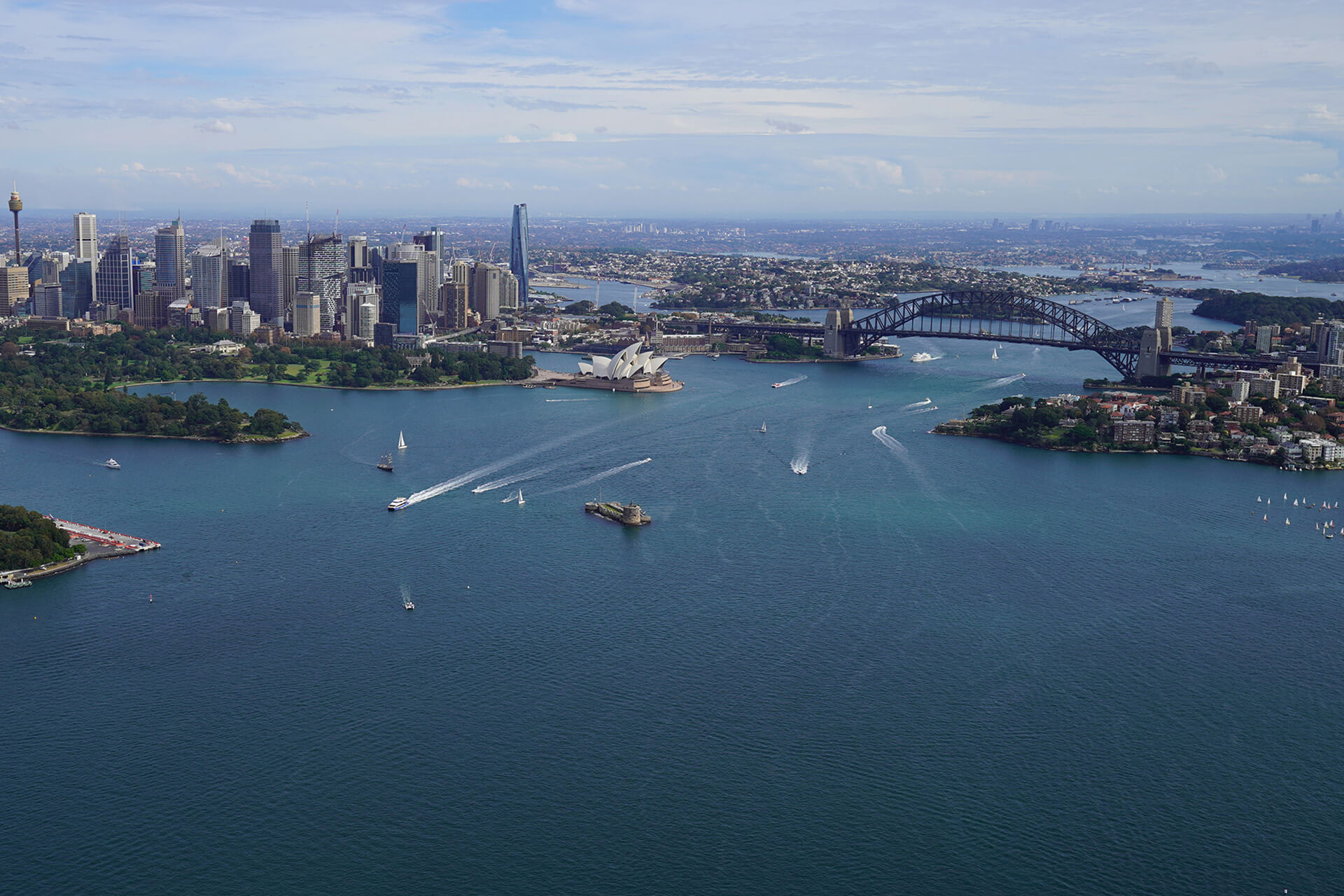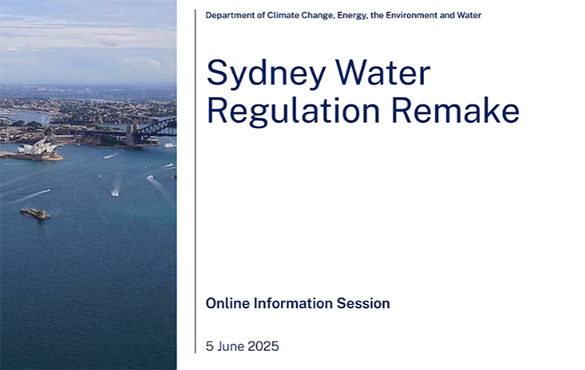Public exhibition closed
The public exhibition period of the draft Sydney Water Regulation remake 2025 ran from Monday 19 May to Sunday 15 June 2025.
Background
The Sydney Water Regulation equips Sydney Water to provide essential drinking water, sewerage, recycled water, drainage and stormwater services to more than 5.4 million people across Greater Sydney.
The Regulation enables Sydney Water to protect its assets, implement water restrictions during drought, and ensure compliance with certain rules relating to Controlled Areas, plumbing and drainage works and water restrictions.
Under the Subordinate Legislation Act 1989 regulations are automatically repealed after five years unless they are remade. Following three one-year postponements of its scheduled repeal in 2022, the Sydney Water Regulation 2017 was automatically repealed on 22 August 2025 when the 2025 Regulation was published.
Report
The department undertook a 3-week public exhibition to seek feedback on the proposed changes. A What we heard report has been prepared, summarising the feedback received during the consultation period.
Timeline
-
19 May 2025
Proposed Sydney Water Regulation 2025 on public exhibition.
-
15 June 2025
Public exhibition ended.
-
22 August 2025
The Sydney Water Regulation 2017 was repealed and the Sydney Water Regulation 2025 commenced.
-
1 September 2025
What we heard report released.
About the project
Most of the content of the 2025 Regulation remains the same as the 2017 Regulation, however, the remake introduced a number of improvements. These changes:
- Modernise processes to improve user experience, customer service and administration, which includes allowing more processes to happen online and simplifying some requirements.
- Increased some penalties for breaching water restrictions to bring them in-line with other similar fines.
- Extend the time period from 2 to 6 years during which Sydney Water can direct a person who carried out defective plumbing works to conduct repairs, and/or impose a fine for failing to comply with the direction. This change ensures directions do not expire before works can be identified and fixed.
- Streamlined and clarified the regulations to improve understanding and compliance.
Public exhibition documents
The Regulatory Impact Statement outlines proposed changes to the Sydney Water Regulation 2017 which supports Sydney Water in delivering its services to the community and meeting its objectives under the Subordinate Legislation Act 1989 (the SL Act).
It also considers the alternative options of allowing the Regulation to lapse (do nothing) and remaking the Regulation as it is.
Public information session
Frequently asked questions
The Sydney Water Regulation 2017 is the current statutory instrument allowing Sydney Water to provide essential drinking water, sewerage, recycled water, drainage and stormwater services to more than 5.4 million people across Greater Sydney, the Blue Mountains and the Illawarra. The Regulation also gives Sydney Water the ability to protect its assets, implement water restrictions during drought, and fine people or corporations when they don’t comply with rules relating to Controlled Areas, plumbing and drainage works and water restrictions.
The Regulation is due for repeal on 1 September 2025, and it needs to be remade so Sydney Water can continue to provide these essential services.
The proposed changes include increasing some penalties for breaching water restrictions to bring them in-line with other similar fines.
Penalties would increase from $220 to $450 for individuals, and from $550 to $900 for corporations.
We are also proposing to set out powers for Sydney Water to authorise connections to its assets as well as to water supply, sewerage or drainage works.
In addition, we are proposing to extend the time period from 2 to 6 years during which Sydney Water can direct a person who carried out defective plumbing works to conduct repairs, and/or impose a fine for failing to comply with the direction. This change ensures directions do not expire before works can be identified and fixed.
| Clause/part | 2017 Regulation | 2025 Regulation |
|---|---|---|
| Part 3 plumbing and drainage, clause 23 (directions) 2025 Regulation, clause 22 and 33 | Sydney Water can direct a person who carried out defective plumbing works to conduct repairs, and/or impose a fine/penalty for failing to comply with the direction. The direction is valid for two years. | The direction will be extended to six years, so that directions do not expire before works are identified and fixed. |
Schedule 1, s50, penalty notice offences 2025 Regulation, Schedule 1, 34(3) | The penalty notice amount for failing to comply with water restrictions is $220 for individuals and $550 for corporations. The maximum fine a court can impose is $550 for individuals, and $5,500 for corporations. | Retain and increase the penalty notice amount for the offence under clause 34(3) related to water restrictions, from $220 to $450 for individuals, and from $550 to $900 for corporations. The maximum fine a court can impose has increased to $5,500 for individuals and $22,000 for corporations. |
| New offences and penalties (19(3), 20(6), (31 (3), 32(6) | It is an offence to not comply with the conditions of permits (100 penalty units for an individual and 200 penalty units for a corporation). | New penalty offences have been included for failing to comply with the conditions of a suspension or cancellation of an authorisation or permit (20(6), 32(6)). They are consistent with amounts for failing to comply with conditions of authorisations or permits (19(3),31(3)). Maximum penalties a court can impose are 100 penalty units for an individual ($11,000) or 200 penalty units for a corporation ($22,000). Penalty amounts of $750 for individuals and $1500 for corporations have been added for all four offences. This is to allow Sydney Water non-court options to enforce compliance with conditions. |
| Part 3 Plumbing and Drainage – Restructure | This part sets out requirements for performance of plumbing and drainage works, including the requirement for a permit to do plumbing or drainage work, conditions around the permits, exemptions, the remedying of defective work and the giving of directions. | The proposed Regulation is restructured to set out powers for Sydney Water to authorise connections to its assets (Part 3) and works for water supply, sewerage or drainage (Part 4). This change is to align more clearly with powers in the Act and is consistent with changes made to the Hunter Water Regulation in 2024. |
We do not expect the proposed changes to have major impacts on residents, businesses or other stakeholders, except those who don’t follow the rules.
No, this will not affect rates or increase charges.
Sydney Water’s rates are set by the Independent Pricing and Regulatory Tribunal (IPART) based on the efficient costs of providing essential services.
IPART sets prices every three to five years, with adjustments for inflation in between reviews. IPART is expected to publish its latest draft determination on 20 May 2025.
Sydney Water can penalise people or corporations who don’t follow safety, disposal, water restriction, or access rules.
These might include things like polluting waters in a controlled area, damaging assets, or building substandard works, as well as breaching water restrictions.
We are proposing to increase penalty amounts for failing to comply with water restrictions from $220 to $450 for individuals; and from $550 to $900 for corporations.
The maximum fine a court can impose has increased from $550 to $11,000 for individuals and from $5,500 to $22,000 for corporations.
This brings it into line with similar offences in the Regulation that pose threats to water quality and security, such as clause 9 (bringing and/or leaving animals in controlled areas), clause 13 (polluting waters), and clause 12 (causing damage, by for example damaging or removing a plant).
The increase also reflects the seriousness of the offence. In addition, we have introduced new penalties for failing to comply with any condition of a suspended or cancelled permit or authorisation. We have also added the option to issue fines instead of pursuing court action.
However, it’s important to note that Sydney Water will only issue a penalty notice after engaging with the alleged offender and all other remediation options have been exhausted.

